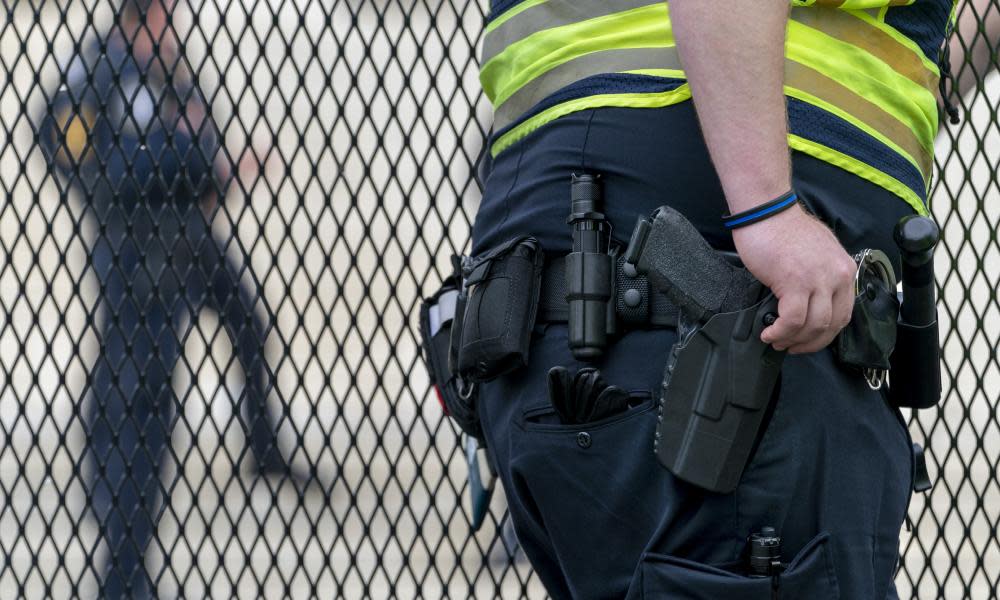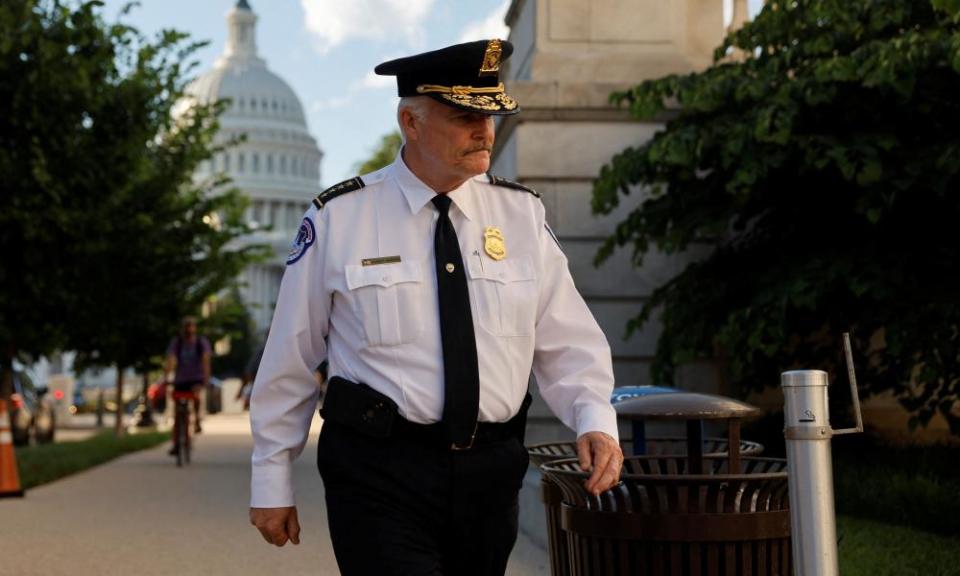‘Medium level of paranoia’: security concerns still loom on Capitol Hill
- Oops!Something went wrong.Please try again later.

As Alexandria Ocasio-Cortez placed personal items on a table before walking through metal detectors and stepping on to the floor of the US House last week the New York Democrat, who has been in Congress since 2019, said bluntly: “I have never felt safe here.”
Security on Capitol Hill is under strain for both lawmakers and the police officers sworn to protect them, even as they relive the deadly insurrection last year amid the ongoing House January 6 committee hearings.
The public has been shown fresh footage and heard testimony of the “war scene” of extremist supporters of Donald Trump assaulting the outnumbered police, charging up the steps and breaking into the Capitol then tearing through the halls yelling threats against members of Congress.
Ocasio-Cortez said last year that she had a close enough encounter on January 6 that she thought she was going to die.
Even as more politicians, staff and tourists are returning to Capitol Hill with the Covid pandemic waning, concerns about security are being bluntly expressed, with police numbers down and threats to politicians sharply up, including against members of the bipartisan January 6 committee this week.
Related: Florida man pleads guilty to threatening to kill Ocasio-Cortez and Pelosi
“There are two people in federal prison right now who threatened my life. The last one was just sentenced three months ago wanting to lynch Representative Steve Cohen and me,” the Missouri Democratic congressman Emanuel Cleaver said, also referencing his Tennessee Democratic colleague.
A man from Marionville, Missouri, had made violent and racist threats by phone and suggested nooses for both congressmen, after the insurrection.
And a man from Kansas City, Missouri, is serving 10 years for an attempted firebombing of Cleaver’s office in 2016.
“I am always concerned about security. I walk around here now with a medium level of paranoia. When I see people do strange things or pick up something, I’m concerned – a lot of us are,” he told the Guardian outside the House floor.
Meanwhile the US Capitol police chief, Thomas Manger, said that in a typical year the force would lose an average of 80 officers in normal attrition, such as to retirement or other jobs.
“The year after January 6, we had closer to 250 [leave],” Manger told the Guardian in an interview.
The department is almost 20% below where Manger wants staff numbers to be and he is leading strenuous efforts to recruit and train as many new officers as rapidly as possible. “We’re still at least a couple hundred if not, actually, probably closer to 400 officers short of where we need to be, ideally,” he said.
Manger sent an email to all his officers on 15 June offering them an $8,000 retention bonus if they remain on the force until 31 December 2023. The email also acknowledged the “challenges” of policing on the Hill since January 6 last year.
“We have more cops now than we had three months ago, we’ll have more cops three months from now … so the good news is that we are beginning to get ahead of attrition,” Manger said.

Metal detectors were installed outside the House chamber after the Capitol attack, amid a more toxic atmosphere there and around the wider Capitol Hill complex, with deep division between lawmakers over almost all aspects of the insurrection.
Long lines can be seen at times outside the House office buildings on the west side of the Capitol because of new security measures that include visitors signing in and being escorted by congressional staff, all while the police are trying to rebuild their numbers.
On 3 June, a man from Michigan was arrested outside the Capitol with a fake law enforcement badge, high-capacity magazines, a BB gun and body armor.
That was 13 months after the Capitol police officer Billy Evans was killed by a man who rammed his car into a barricade at the Capitol’s east front, following the insurrection that January which a bipartisan Senate report linked to seven deaths, including two Capitol police officers.
Adding to the tension has been suspicion about “reconnaissance tours” of the Capitol by lawmakers for people who then joined the insurrection and Republican contrariness over the violence and investigations, alongside, conversely, allegations that some police were sympathetic to the mob.
And the inspector general of the Capitol police in April last year criticized how ill-prepared the department was for January 6 despite evidence that Congress was to be targeted, then for being slow to implement reforms.
Manger was sworn in as the new chief in July 2021, after retiring as police chief of Montgomery county, Maryland.
Related: The findings of the January 6 investigation are damning | Moira Donegan
“When I got here, I talked about the fact that there were a lot of deficiencies pointed out in the inspector general reports – as a result of January 6, a lot of deficiencies were exposed,” he told the Guardian.
Manger said staffing numbers were “the biggest problem we have”, with other priorities being better intelligence, organizational planning, equipment and training.
With short-staffing, the department has “made it through” by making officers work double shifts. “And this was an unsustainable strategy. I mean, cops were getting burnt out,” he said.
He explained he had prioritized recruiting and was making progress to “get this department back where it should be”, which he said would take “at least a few years”.
In other security headaches, tourist visits are getting closer to pre-pandemic normal, but some Capitol tour guide staff, conspicuous in their red jackets and black pants confided to the Guardian that it was sometimes a challenge to keep track of everyone on such tours.
And the fierce debate about whether politicians should be able to bring firearms to the Capitol continues, leaving some who want the complex to be a gun-free zone for all except law enforcement worried that the next threat to their safety could come from within.
Congressman Cleaver said: “If people start carrying weapons in here I am going to be a full-time member on Zoom. I didn’t come up here to get killed. I came up here to get legislation passed.”

